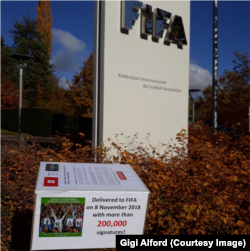Women’s rights activists who have been calling for Tehran to end a ban on Iranian women attending men’s football matches have taken their campaign to the home of football’s world governing body, FIFA.
Three female activists, two of them Iranian, met with FIFA Secretary General Fatma Samoura in the Swiss city of Zurich Thursday. The meeting came two days before Tehran’s Azadi Stadium hosts its first Asian Champions League final in 11 years between home team Persepolis and Japan’s Kashima Antlers.
Iran’s Islamist rulers have banned female Iranian football fans from buying tickets to attend such matches for decades, citing concerns that their presence would lead to immoral acts involving men.
In a tweet posted after Thursday’s meeting, FIFA’s No. 2 official described her talks with the three activists as very constructive.
“Their courage & passion for football is remarkable. We will keep engaging with them, as well as public & authorities in Iran to work towards stadium access for all,” Samoura wrote.
Appreciation and frustration
In phone calls with VOA Persian, the activists expressed appreciation for the meeting with Samoura but also frustration with what they said was her lack of detail on how FIFA will address their concerns.
Iranian activist Maryam Qashqaei Shojaei, who requested a meeting with FIFA leadership during this year’s World Cup in Russia, said she led the talks with Samoura and spoke to her for about 25 minutes.
“She asked a few questions about the nature of the ban (on Iranian women buying stadium tickets for men’s sports), but didn’t comment,” Shojaei said. “FIFA’s job is to protect its own principles. Gender discrimination is against those rules. That is the only thing we asked, just to follow your own rules.”
Article 4 of FIFA’s statutes says discrimination of any kind against a group of people because of gender is “strictly prohibited and punishable by suspension or expulsion.”
In a previous statement to VOA Persian, FIFA said its president, Gianni Infantino, told Iranian President Hassan Rouhani during a visit to Tehran in March that it is important for “all football fans irrespective of gender” to be allowed to cheer and support their favorite teams inside stadiums.
Rouhani’s official website quoted him as telling Infantino that Iran “always has tried to provide more and more access to sport.”
FIFA ready to do more?
Gigi Alford, a Switzerland-based coordinator for the Sports and Rights Alliance (SRA) group, also attended the meeting with Samoura. SRA is a coalition of international NGOs, sports organizations and trade unions working to embed human rights in the world of sport.
“Samoura conveyed a sense that FIFA is ready to do more, but she wasn’t yet ready to share details in the meeting,” Alford told VOA Persian. “It’s clear that FIFA understands the impact the ban is having on women, but it’s not clear what FIFA plans to do about it and when. Without clear action, Iran won’t know that FIFA is serious about upholding human rights and gender equality.”
Alford and Shojaei appeared in a photo attached to Samoura’s tweet, presenting the FIFA official with a change.org petition calling for an end to Tehran’s ban on female Iranian fans attending men’s sports. More than 201,000 people around the world had signed the petition as of late Thursday.
Some women allowed in
In a rare move, Iranian authorities allowed about 100 women into Azadi Stadium for an Oct. 16 men’s friendly football match between the Iranian and Bolivian national teams. Iranian state-run news agency ILNA said the group included female employees of Iran’s soccer federation and members of the Iranian women’s national soccer team, along with female journalists and other women who were permitted to enter the stadium at the last minute.
But local authorities maintained their ban on ticket sales to female members of the general public.
The other female Iranian activist who joined Thursday’s meeting at FIFA’s headquarters, who asked not to be identified, told VOA Persian that she was not sure whether Iran would again allow a small and select group of women to watch Saturday’s Asian Champions League final.
“We don’t want this to become a routine,” said the Iran-based activist, who runs an anti-discrimination social media campaign using the Twitter handle @OpenStadiums. “We’ve had the same problem with volleyball. Only female relatives of male players and female staff of the federation can attend those games. This is not progress when you let only those women attend and don’t sell tickets to other women.”
The activist said she does expect Japanese women to be allowed to attend Saturday’s match, in line with Iran’s longstanding practice of allowing foreign women to enter Azadi Stadium to support foreign teams.
“We usually protest at the stadium entrance as the foreign women enter it right in front of us,” the activist said. “It’s bizarre and sad.” She said Iran allows such women into Azadi Stadium to avoid foreign football federations from making objections to FIFA.
Saturday’s match is the second leg of a final that began with Kashima earning a 2-0 home win over Persepolis Nov. 3.
This article originated in VOA’s Persian Service.





